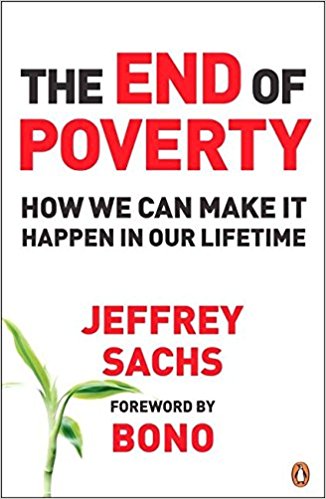The End of Poverty Summary
3 min read ⌚
 Economic Possibilities for Our Time
Economic Possibilities for Our Time
We need a new plan to distribute the worldly wealth if we want to secure and maintain economic prosperity.
“The rich get richer, and the poor get poorer” – the majority of people no longer support separation and injustice.
About Jeffrey D. Sachs
 Jeffrey D. Sachs is an economic expert, an author and the director of the Earth Institute at Columbia University.
Jeffrey D. Sachs is an economic expert, an author and the director of the Earth Institute at Columbia University.
“The End of Poverty Summary”
“The End of Poverty” is a book that arrives at the perfect moment. Economists will be thrilled by its uniqueness and comprehensiveness. Jeffrey D. Sachs has all the right in the world to share his opinion about the wealth distribution since he had the privilege of having the leading role in major economic “clashes” in the past 30 years.
Jeffrey was part of the team of experts that ended the hyperinflation in Bolivia. He also advised Poland how to secede from the Soviet Union (even though it was an independent country, the Soviet Politburo had a lot of influence on their state regulation) and communism.
In his extensive studies, Jeffrey implies that economic “Super Powers” must modify their worldly policies, if we want to end the depression and cut poverty.
In reality, many facts indicate that the distribution of wealth is anything but well-distributed. Here is some information that will give you a clue on how selfish and ignorant we are:
-
- Approximately, one billion Africans live on the verge of extinction.
-
- 20% of the worldly population have limited access to safe drinking water
-
- 30% of the population are from the middle-class, and they mostly live in the cities. This social group has a level of comfort that includes education, indoor plumbing, possession of cars, etc.
- 13% of the people are considered to be rich, but estimating wealthiness is a hard thing to do because being wealthy by global standards doesn’t always indicate the same result in your homeland.
Economic growth stimulated by modern equipment and capital has occurred in every corner of the world. According to Jeffrey, rich countries are not responsible for the poorness existing in less industrialized communities.
Our job is to find out what is keeping these countries at the bottom of economic prosperity. In general, “social diseases” such as corruption, tribalism, lack of leadership skills, and capital are most eligible to bear the nickname “the stimulator of poverty.”
-
- Human Capital – lacking proper education, skills, know-how, and health.
-
- Industrialization – lacking the proper machinery for producing goods.
-
- Infrastructure Capital – Roads, electricity, telecommunications.
- Institutional Investments – Laws, government support, new regulations.
Key Lessons from “The End of Poverty”
1. Scarcity of innovation
2. We must do something
3. The voice of the poor
Scarcity of innovation
A small country in transition with a limited market will not have the means to support innovation. A real incentive can only derive from a good business climate, which is not usually the case.
If the country’s policies fail to create a favorable environment for attracting investors that will only deepen the crisis and endanger the economic growth.
We must do something
Many countries are facing political instability and clashes due to economic stagnation. Ending poverty has never been more realistic than now.
The best thing to do is to embrace foreign capital to stimulate the economy.
The voice of the poor
Our words will reach no one if the poor and weak don’t raise their voice against this social injustice.
Just like Nelson Mandela, everyone’s complaints will be heard – sooner or later.
Like this summary? We’d Like to invite you to download our free 12 min app, for more amazing summaries and audiobooks.
“The End of Poverty” Quotes
The antiglobalization movement should mobilize its vast commitment and moral force into a proglobalization movement on behalf of a globalization that addresses the needs of the poorest of the poor, the global environment and the spread of… Click To Tweet When poverty is very extreme, the poor do not have the ability – by themselves – to get out of the mess. Click To Tweet Many of the world’s poorest countries are severely hindered by high transport costs, because they are landlocked; situated in the high-mountain ranges; or lack navigable rivers, long coastlines or good natural harbors. Click To Tweet The omnipresence of disease and death…played a deep role in Africa’s prolonged inability to develop economically. Click To Tweet The key for the United States to become the world’s richest major economy was not spectacularly fast growth, such as China’s recent achievement of 8% growth per year, but rather steady growth at a much more modest 1.7% per year. Click To Tweet
Emir is the Head of Marketing at 12min. In his spare time, he loves to meditate and play soccer.


 Economic Possibilities for Our Time
Economic Possibilities for Our Time



